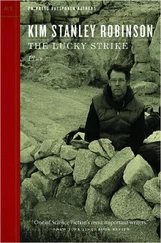So they are all back in the cave. The wind swirls in it, and the others have spent the previous day piling rocks into the south side of the cave mouth, to build a protective wall. It helps a bit.
As the fourth day of the storm passes in the whistle and flat of wind, and an occasional flurry of snow, all the members of the climb crowd into one of the large box tents, sitting upright and bumping arms so they will all fit.
“Look, I don’t want to go down just because one of us has a busted arm,” Marie says.
“I can’t climb,” says Frances. It seems to Roger that she is holding up very well; her face is white and her eyes look drugged, but she is quite coherent and very calm.
“I know that,” Marie says. “But we could split up. It’ll only take a few people to get you back down to the cars. The rest of us can take the rest of the gear and carry on. If we get to the cache at the top of the scarp, we won’t have to worry about supplies. If we don’t, we’ll just follow you down. But I don’t fancy us giving up now—that’s not what we came for, eh? Going down when we don’t have to?”
Eileen looks at Ivan. “It’d be up to you to get Frances down.”
Ivan grimaces, nods. “That’s what Sherpas are for,” he says gamely.
“Do you think four will be enough for it?”
“More would probably just get in the way.”
There is a quick discussion of their supply situation. Hans is of the opinion that they are short enough on supplies to make splitting up dangerous. “It seems to me that our primary responsibility is to get Frances to the ground safely. The climb can be finished another time.”
Marie argues with him, but Hans is supported by Stephan, and it seems neither side will convince the other. After an apprehensive silence, Eileen clears her throat.
“Marie’s plan sounds good to me,” she says. “We’ve got the supplies to go both ways, and the Sherpas can get Frances down by themselves.”
“Neither group will have much margin for error,” Hans says.
“We can leave the water for the group going down,” Marie says. “There’ll be ice and snow the rest of the way up.”
“We’ll have to be a bit more sparing with the oxygen,” Hans says. “Frances should have enough to take her all the way down.”
“Yes,” Eileen says. “We’ll have to get going again in the next day or two, no matter what the weather’s like.”
“Well?” says Marie. “We’ve proved we can get up and down the fixed ropes in any weather. We should get up and fix Camp Nine as soon as we can. Tomorrow, say.”
“If there’s a bit of a break.”
“We’ve got to stock the higher camps—”
“Yeah. We’ll do what we can, Marie. Don’t fret.”
While the storm continues they make preparations to split up. Roger, who wants to stay clear of all that, helps Arthur to build the wall at the cave’s entrance. They have started at the southern end, filling up the initial crack of the cave completely. After that they must be satisfied with a two-meter-high wall, which they extend across the entrance until the boulders on the floor of the cave are used up. Then they sit against the wall and watch the division of the goods. Wind still whistles through the cave, but sitting at the bottom of the wall they can feel that they did some good.
The division of equipment is causing some problems. Marie is very possessive about the oxygen bottles. “Well, you’ll be going down, right?” she demands of Ivan. “You don’t need oxygen at all once you get a couple camps down.”
“Frances will need it a lot longer than that,” Ivan says. “And we can’t be sure how long it’ll take to get her down.”
“Hell, you can reel her down once you get past the Thank God Ledge. Shouldn’t take you any time at all—”
“Marie, get out of this,” Eileen snaps. “We’ll divide the supplies. There’s no reason for you to bother with this.”
Marie glares, stomps off to her tent.
Arthur and Roger give each other the eye. The division goes on. Rope will be the biggest problem, it appears. But everything will be tight.
At the first break in the winds the rescue party—Frances and the four Sherpas—take off. Roger descends with them to help them cross the Thank God Ledge, and to recover the fixed rope there. The wind still gusts, but with less violence. In the middle of the ledge crossing Frances loses her balance and swings around; Roger reaches her (not noticing he ran) and holds her in. “We have to stop meeting like this,” Frances says, voice muffled by her mask.
When they reach the Great Gully, Roger says his goodbyes. The Sherpas are cheery enough, but Frances is white-faced and quiet. She has said hardly a word in the last couple of days, and Roger cannot tell what she is thinking. “Bad luck,” he tells her. “You’ll get another chance, though.”
“Thanks for grabbing me during the drop from Camp Nine,” she says just as he is about to leave. She looks upset. “You’re awfully quick. That would have hurt like hell if I had rolled onto my left side.”
“I’m glad I could help,” Roger says. Then, as he leaves, “I like how tough you’ve been.”
A grimace from Frances.
On the way back Roger must free the fixed rope to recover it for the climb above, so on the Thank God Ledge he is always belayed only to the piton ahead. If he were to fall he would drop—sometimes up to twenty-five meters—and swing like a pendulum over the rough basalt. The ledge becomes new again; he finds that the smooth surface of the sidewalk is indeed wide enough to walk on, but still—the wind pushes at his back—he is alone—the sky is low and dark, and threatens to snow—and all of a sudden the hair on his neck rises, the oxygen whistles in his mask as he sucks it down, the pitted rock face seems to glow with an internal light of its own, and all the world expands, expands ever outward, growing more immense with every pulse of his blood; and his lungs fill, and fill, and fill.
Back in the cave Roger says nothing about the eerie moment on the ledge. Only Eileen and Hans are still in the cave—the others have gone up to supply the higher camps, and Dougal and Marie have gone all the way up to Camp Nine. Eileen, Hans, and Roger load up their packs—very heavy loads, they find when they duck out the cave—and start up the fixed ropes. Jumaring up the somewhat icy rope is difficult, in places dangerous. The wind strikes from the left now rather than from above. By the time they reach Camp Seven it is nearly dark, and Stephan and Arthur already occupy the single tent. In the mirror dusk and the strong side wind, erecting another tent is no easy task. There is not another level spot to set it on either—they must place it on a slope, and tie it to pitons hammered into the cliff. By the time Eileen and Roger and Hans get into the new tent, Roger is freezing and starving and intensely thirsty. “Pretty bloody desperate,” he says wearily, mimicking Marie and the Sherpas. They melt snow and cook up a pot of stew from their sleeping bags, and when they are done eating, Roger puts on his oxygen mask, sets the flow for sleep, and slumps off.
The moment on the Thank God Ledge jumps to mind and wakes him momentarily. Wind whips the taut walls of the tent, and Eileen, penciling logistic notes for the next day, slides down the slope under the tent until their two sleeping bags are one clumped mass. Roger looks at her: brief smile from that tired, puffy, frost-burned face. Great deltas of wrinkles under her eyes. His feet begin to warm up and he falls asleep to the popping of the tent, the hiss of oxygen, the scratching of a pencil.
That night the storm begins to pick up again.
The next morning they take down the tent in a strong wind—hard work—and start portering loads up to Camp Eight. Halfway between camps it begins to snow. Roger watches his feet through swirls of hard, dry granules. His gloved fingers twist around the frigid jumar, sliding it up the frosted rope, clicking it home, pulling himself up. It is a struggle to see footholds in the spindrift, which moves horizontally across the cliff face, from left to right as he looks at it. The whole face appears to be whitely streaming to the side, like a wave. He finds he must focus his attention entirely on his hands and feet. His fingers, nose, and toes are very cold. He rubs his nose through the mask, feels nothing. The wind pushes him hard, like a giant trying to make him fall. In the narrow gullies the wind is less strong, but they find themselves climbing up through waves of avalanching snow, drift after drift of it piling up between their bodies and the slope, burying them, sliding between their legs and away. One gully seems to last forever. Intermittently Roger is concerned about his nose, but mostly he worries about the immediate situation: moving up the rope, keeping a foothold. Visibility is down to about twenty meters—they are in a little white bubble flying to the left through white snow, or so it appears.
Читать дальше
Конец ознакомительного отрывка
Купить книгу












